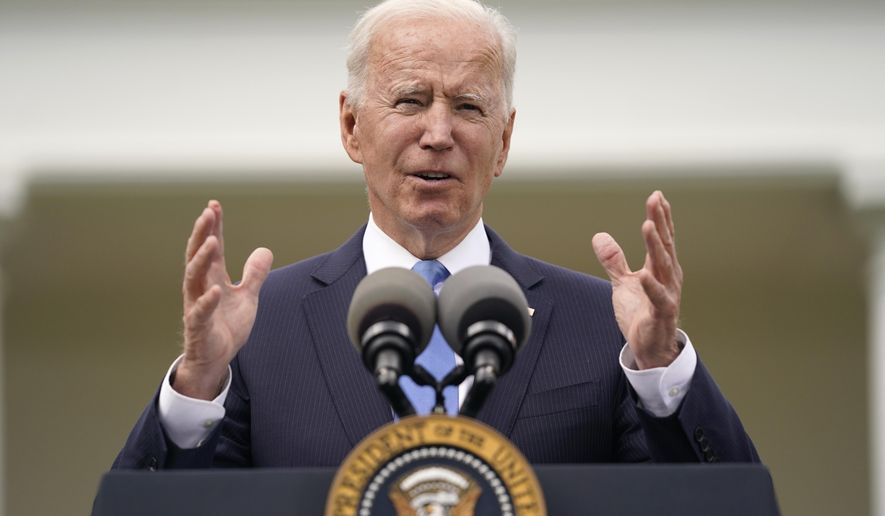High-level White House officials have undercut President Biden’s rejection of the Keystone XL pipeline in their rush to respond to a crippling cyberattack that has left much of the East Coast facing gasoline shortages.
The paradox was evidenced Friday, when Transportation Secretary Pete Buttigieg praised Colonial Pipeline, the nation’s largest pipeline refinery system, for resuming operation after a paralyzing ransomware attack. Mr. Buttigieg argued that the benefit would be immediate since it was taking significantly longer to deliver fuel via other means.
“Well, certainly, when you’re talking about the efficiency of moving petroleum products, that’s why we have pipeline[s],” the transportation secretary said.
The admission was the most recent from top Biden administration officials, who found themselves struggling to distribute gasoline to areas that rely predominantly on Colonial’s pipelines.
“These are not easy solutions because there may or may not be the right rail cars, there … may not be the deep-water ports available,” said Energy Secretary Jennifer Granholm. “This is why we have doubled down on ensuring that there’s an ability to truck [gas] in, but the [pipeline] is the best way to go.”
Even the White House’s international climate czar, former Secretary of State John F. Kerry, told Congress last week that pipelines were more efficient and produced fewer greenhouse gas emissions than trains or trucks.
“I think that is true, but it doesn’t mean necessarily we want to be adding another [pipe]line when there are other alternatives,” Mr. Kerry said. “But is it better than train, better than that? Yes it is, in my judgment.”
The statements undercut actions Mr. Biden has taken on the energy front since entering office.
On his first day in the White House, Mr. Biden revoked the permit for the Keystone XL pipeline system. If built, the pipeline would carry more than 800,000 barrels of oil a day from Canada to refineries on the Gulf Coast. The project also would have created more than 13,000 jobs in the energy industry and related fields.
At the time, Mr. Biden argued that “leaving the Keystone XL pipeline permit in place would not be consistent with” his economic and climate priorities.
Given that history, some energy experts are shaking their heads at the recent comments from Ms. Granholm, Mr. Buttigieg and others.
“It seems the administration’s fantasies on climate change have come up against reality, and reality usually wins,” said Myron Ebell, director of the conservative Competitive Enterprise Institute’s Center for Energy and Environment. “The idea that we can’t build more pipelines is ridiculous … and the idea that they are unsafe or inefficient is wrong, as now even the current administration seems to be acknowledging.”
Still, most political observers believe the Biden administration is unlikely to reverse its opposition to building new pipelines.
The reason is nuanced and political. Mr. Biden’s climate change goals, specifically a more than 50% decrease in carbon emissions by 2030, require the country to curb its use of fossil fuels. One way to do that, apart from limiting drilling for oil and natural gas and pushing renewable technology, is to make fossil fuels more difficult to transport.
“What it’s really about is restricting the supply of a product, fossil fuels, that is used for more than 80% of all energy in the U.S.,” said Dan Kish, a senior fellow at the Institute for Energy Research. “Ultimately, it’s about driving up the costs of fossil fuels so that people will see the alternatives, which are currently unaffordable for most Americans, as the only way to go.”
The Biden administration’s stance is also political. Over the past decade, climate-change activists have increasingly become ascendant within the Democratic Party.
Some activists and groups, including the Sunrise Movement, have formed to pressure Democrats into moving left on the topic. For many, opposition to energy pipelines such as Keystone XL was a litmus test during the 2018 and 2020 elections.
“Instead of building pipes to pump oil, we can build pipes to ensure clean water for Flint, [Michigan] and the 63 million other Americans without clean water,” said Ellen Sciales, a spokeswoman for the Sunrise Movement.
• Haris Alic can be reached at halic@washingtontimes.com.




Please read our comment policy before commenting.